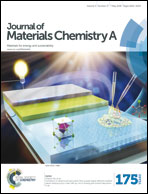Phase formation and conductivity degradation of Sr1−xKxSiO3−0.5x ionic conductors
Abstract
The new ionic conductor Sr1−xKxSiO3−0.5x was first reported by Singh et al. as a promising candidate electrolyte for solid oxide fuel cells. Here we report the thermal evolution of the phase formation and ionic conductivity of the composition x = 0.2. The results disclose the co-existence of crystalline and amorphous phases in the material at room temperature, and the amorphous phase would crystallize into K2SiO3 and SiO2 on heating at ∼650 °C and return to the amorphous state at a temperature ≥1020 °C. Both the VT-XRD and conductivity data revealed that firing at a temperature above 1100 °C is favourable for maintaining the amorphous phase at ambient temperature. The phase evolution explains the conduction behavior. A K2Si2O5 glass was prepared in this work, and a high ionic conductivity was observed for this material, which was most likely responsible for the high ionic conductivity in Sr1−xKxSiO3−0.5x (x = 0.2). However, both the Sr1−xKxSiO3−0.5x (x = 0.2) and K2Si2O5 did not show strong evidence of oxide ion conduction.


 Please wait while we load your content...
Please wait while we load your content...